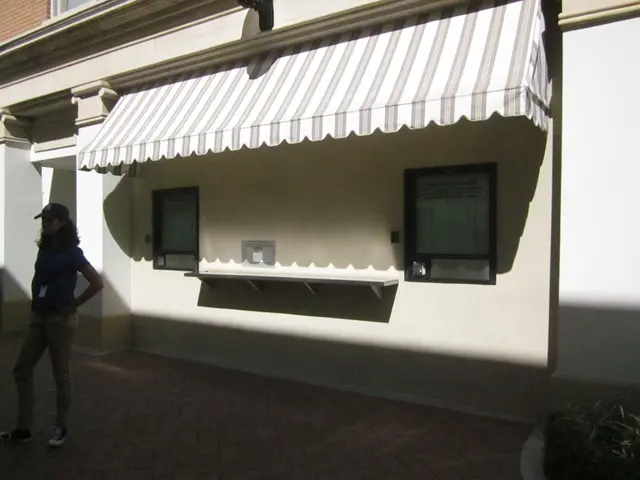Surviving the Storm: Ukraine's Defense Strategy in an uncertain world
"Newly elected German Chancellor sparks optimism"
In the heart of Eastern Europe, experts in Ukraine grapple with the country's battle against Russia and its wavering Western alliance. As tanks parade in Moscow, commemorating victory against Fascism, Kyiv ponders its future without the unwavering support of the USA: Is there life after NATO under President Trump? Can peace prevail? And if not, what weapons hold the key to victory?
"We're right on the front line in a precarious predicament," offered Ukraine's former President Petro Poroschenko at the Kyiv Security Forum. Honored guests from the Western world attended, including Germany. The nation is depleted of manpower, technology, ammunition, and weapons, especially air defense. "We're pinning our hopes on the new German Chancellor," Poroschenko declared emphatically. "I've had a chance to converse with him just a few days ago, and I was thoroughly impressed by his dedication to fortify and assert Germany's leading role in all of Europe." Everybody understands that it's not merely about aiding Ukraine, but an investment in European security.
The Uncertain Western Alliance
Since Trump assumed the presidency, cracks in the Western alliance have surfaced. Ukraine, confronted by Russian troops standing on its territory for over a decade and embroiled in a fierce conflict since February 2022, refuses to accept this divisiveness. In his opening address, Ukraine's former Prime Minister Arseniy Yatsenyuk called on the allies: "We did it 80 years ago, and we will restore order in the world again."
Winning the War: Arming for Success
Yatsenyuk didn't mince words: When "the free world" attempted a deal with Hitler in 1938, disaster ensued. "Hitler unleashed a massive invasion of Ukraine." Today, Putin plays by a different set of rules than Trump. He warned China and the Global South: "Those claiming neutrality or presenting themselves as mediators must understand that you cannot be neutral in this war; you must take sides, otherwise, you're an accomplice."
Kurt Volker, Trump's former Ukraine envoy, later sat on a panel and discussed the peace efforts of the White House. "Putin will never accept peace," Volker asserted bluntly. "We require military deterrence." Trump's administration exerts considerable pressure on Ukraine, but pressure on Moscow remains minimal, Volker explained. The pressure upon Moscow must be intensified to nudge Russia towards a ceasefire. Trump misunderstands Putin's motives because he's driven by what he considers a good deal.
The Power of Drones
The future of warfare lies in unmanned systems, according to Vyacheslav Shutenko, commander of a battalion specializing in unmanned systems. "Drone technology is no longer supplementary; it's decisive on the battlefield." Ukraine desperately requires more drones to claim victory, said Shutenko. "We need consistent drone production and continuous supply of drones to Ukrainian military and combat units to stand a chance against the formidable Russian army."
Innovations from the Frontline
Shymkiw, a tech entrepreneur, emphasized that only the most advanced technologies can safeguard soldiers' lives. Cutting-edge innovations occur as a result of a "will to survive." Adaptable collaborations take place between engineers and units in real-time during deployment. Such technologies not only save Ukrainian lives but also benefit the armaments industries of allies such as Germany, Britain, and Portugal.
Yet, Ukraine cannot win the war with drones alone. Commander Shutenko underlined the importance of well-trained personnel for infantry and attack units, as well as continuous international support through diplomacy, military assistance, and air support. "We need it all because we're fighting here in Ukraine against one of the most powerful armies in the world. If we push them back, they'll realize the futility of their aggression and beg for negotiations."
Negotiations and Accountability
So far, negotiations haven't been favorable for Ukraine. Julia Kazdobina, director of the Ukrainian Foundation for Security Research in Krakow, Poland, expressed frustration with the US government's handling of the situation. "It attempts to create peace without considering the history of the war and its root causes. It treats both sides of the conflict equally and disregards the fact that Russia is the aggressor and the aggression is deliberate and premeditated." Offering concessions to Russia won't solve the predicament, according to Kazdobina. "That move would harm Ukraine more than it would help."
The Path Ahead
An ideal scenario would be continued US aid. Experts view the ratified resource agreement with the United States as a positive sign. Zelensky's insistence on saying no has proven advantageous. Ambassador Steven Pifer, who served in Ukraine from 1998 to 2000, sees value in continuing US involvement, but he stresses that Ukraine needs a contingency plan. "Kyiv must have a Plan B."
- Attack on Ukraine
- Ukraine
- Russia
- Friedrich Merz
- Ceasefire
- Arms delivery
- Donald Trump
- Vladimir Putin
Enrichment Data:
Overall:
Ukraine's defense strategy is evolving in response to shifting geopolitical scenarios, recognizing the possibility of diminishing or absent US support. Here's how Ukraine's defense strategy might adapt:
Evolving Defense Strategy
- Diversification of Military Supplies:
- Alternative Partners: Ukraine could strengthen partnerships with other Western allies, such as the EU, UK, France, and Germany, to ensure a steady flow of military equipment and technology, with Poland and the Baltic states playing significant roles.
- Turkey and Asia: Ukraine could explore partnerships with Turkey for drones and military equipment or establish connections with other countries across Asia for additional alternative suppliers.
- Domestic Production and Partnerships:
- Boosting Indigenous Capability: Ukraine is focusing on strengthening its own defense industrial base, such as building up domestic weapon production and establishing partnerships with international contractors to reduce reliance on foreign equipment.
- Diplomatic and Strategic Alliances:
- Regional Alignments: Strengthening regional alliances with countries like Poland, the Baltic states, and potentially Turkey could offer additional diplomatic leverage against Russia.
- Innovative Warfare and Tactics:
- Asymmetric Warfare Strategies: Ukraine has demonstrated capabilities in conducting long-range strikes and employing drones and cyber operations to disrupt enemy command structures. Enhancing these capabilities can be an effective strategy without heavy reliance on conventional military equipment.
In summary, Ukraine's defense strategy involves diversifying military supplies, developing domestic production, forming strategic alliances, and employing innovative warfare tactics. While US support is crucial, Ukraine is exploring alternative partnerships to ensure sustained defense capabilities against Russian aggression.
- In light of potential diminishing US support, Ukraine may seek to strengthen partnerships with other Western allies, such as the EU, UK, France, and Germany, to secure a consistent flow of military equipment and technology.
- Ukraine could explore partnerships with Turkey for drone technology or establish connections with other countries across Asia for additional alternative military equipment suppliers.
- Realizing the importance of self-reliance, Ukraine is strengthening its own defense industrial base, focusing on building up domestic weapon production and establishing partnerships with international contractors to reduce reliance on foreign equipment.
- Ukraine is also intensifying regional alliances with countries like Poland, the Baltic states, and potentially Turkey to gain additional diplomatic leverage against Russia.
- Asymmetric warfare strategies, including long-range strikes, drone operations, and cyber attacks, are being enhanced to effectively counter Russian aggression without heavy reliance on conventional military equipment.








